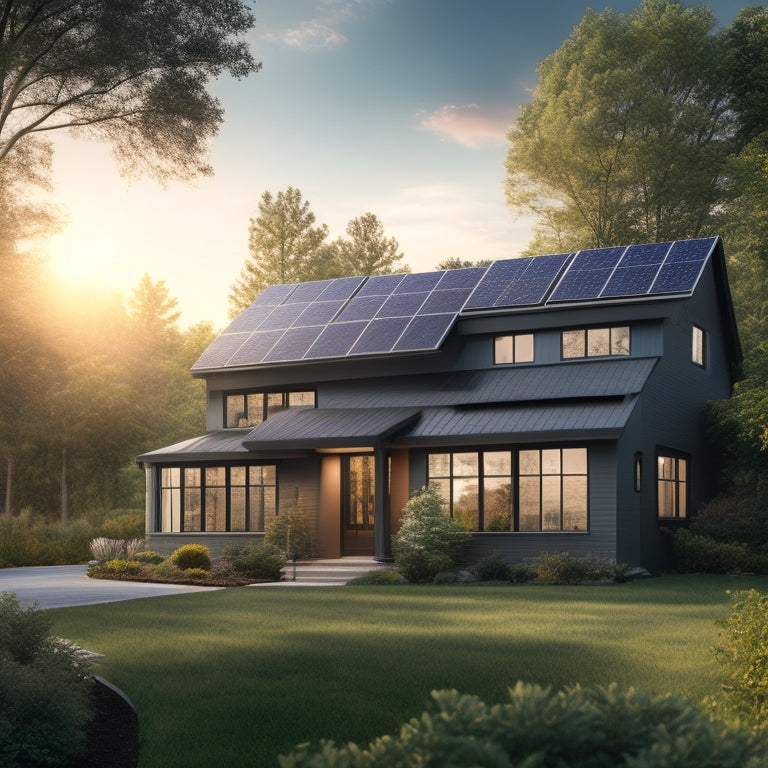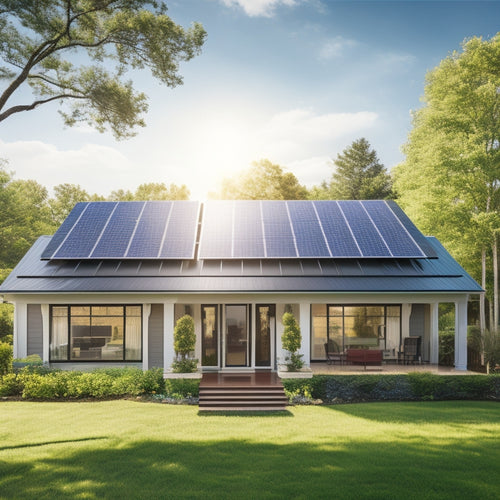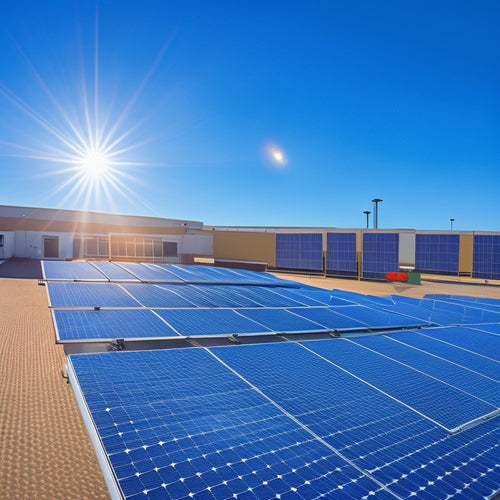
10 Best DIY Solar Power Systems for Home Installation
Share
You're considering a DIY solar power system for your home, and you want to know the top-rated options. When choosing a system, consider your solar technology preferences, decide between grid-tie or off-grid systems, and look for high-efficiency panels, durable mounting systems, and reliable inverters. Confirm compatibility with local building codes and regulations. Reap the benefits of solar energy, including eco-friendliness, cost-effectiveness, and reduced energy bills. Take a closer look at top-rated DIY solar kits, off-grid systems, and residential bundles to find the perfect system for your home installation.
Key Takeaways
• Consider high-efficiency panels, durable mounting systems, and reliable inverters for a DIY solar power system.
• Look for comprehensive warranties, compatibility with local codes, and streamlined purchasing processes.
• Opt for high-capacity batteries, high-power inverters, and adjustable mounting systems for off-grid systems.
• Enhance energy efficiency, explore budget-friendly options, and consider green financing for affordable DIY solar solutions.
• Verify roof structural soundness, follow proper wiring practices, and plan for regular panel maintenance for a successful DIY installation.
Top-Rated DIY Solar Kits
When shopping for a DIY solar power system, you'll find a variety of top-rated kits on the market that cater to different needs and budgets. These kits usually include solar panels, inverters, mounting hardware, and other necessary components.
As you explore your options, consider the type of solar technology that suits your requirements. For instance, do you prefer monocrystalline or polycrystalline solar panels? Do you need a grid-tie or off-grid system?
Renewable energy solutions like DIY solar kits are gaining popularity due to their eco-friendly and cost-effective nature. With the advancement in solar technology, these kits have become more efficient and affordable.
When selecting a kit, look for features like high-efficiency panels, durable mounting systems, and reliable inverters. Confirm that the kit you choose is compatible with your local building codes and regulations. Additionally, consider the warranty and customer support offered by the manufacturer.
Best Off-Grid Solar Systems
You'll need an off-grid solar system that can provide reliable, standalone power if you live in a remote area or want energy independence, and the best systems typically include high-capacity batteries, efficient charge controllers, and durable solar panels. This setup allows you to achieve grid independence, perfect for remote living.
When selecting the best off-grid solar system, consider the following key components:
| System Component | Key Features | Recommended Brands |
|---|---|---|
| Solar Panels | High-efficiency, durable | Panasonic, SunPower |
| Charge Controllers | MPPT, high-efficiency | Victron, OutBack |
| Batteries | Deep cycle, high-capacity | Trojan, Rolls-Surrette |
| Inverter/Charger | High-power, efficient | Magnum, Schneider |
| Mounting System | Adjustable, durable | Unirac, IronRidge |
Look for systems that integrate these components seamlessly, ensuring a reliable and efficient off-grid solar experience. By choosing the right off-grid solar system, you can enjoy the freedom of remote living while maintaining a reliable connection to power.
Residential Solar Panel Bundles
Residential solar panel bundles streamline the process of purchasing individual components by packaging high-quality solar panels, inverters, and mounting hardware into a single, convenient package tailored to your specific energy needs. This efficient approach saves you time and effort, guaranteeing a smooth installation experience.
When selecting a residential solar panel bundle, consider the following key factors:
-
Solar Warranty: Look for bundles that offer a thorough warranty covering the entire system, including panels, inverters, and mounting hardware, for at least 25 years.
-
Panel Efficiency: Opt for bundles featuring high-efficiency panels (above 20%) to maximize energy production and minimize roof space requirements.
-
Compatibility: Make sure the bundle's components are compatible with your existing electrical infrastructure and local building codes.
Affordable DIY Solar Solutions
As you explore affordable DIY solar solutions, you'll find budget-friendly options that won't break the bank.
You can opt for easy installation kits that simplify the process, or consider cost-effective solutions that maximize your energy output.
Budget-Friendly Options
Embracing the eco-friendly revolution, homeowners can now harness the power of the sun without breaking the bank, thanks to a plethora of budget-friendly DIY solar solutions that cater to diverse needs and wallets. As you explore the world of DIY solar power, you'll find that energy efficiency and green living are no longer luxuries reserved for the wealthy. With affordable options, you can reduce your carbon footprint and save on energy bills.
Here are some budget-friendly options worth exploring:
-
** Starter kits**: These kits usually include a small number of panels, an inverter, and mounting hardware, perfect for small-scale energy harvesting.
-
Grid-tie systems: These systems allow you to sell excess energy back to the grid, offsetting your energy costs and providing a potential source of income.
-
Solar panel bundles: Buying in bulk can greatly reduce the cost per panel, making it an attractive option for those looking to install a larger system.
Easy Installation Kits
You can get started with DIY solar power using easy installation kits, which typically include pre-assembled components and straightforward instructions, allowing you to set up a functional solar power system in a matter of hours. These kits are designed to simplify the installation process, making it accessible to homeowners with little to no technical expertise.
With easy installation kits, you can focus on getting your solar power system up and running quickly, without worrying about the complexities of solar panel installation.
One of the key benefits of easy installation kits is their attention to wire management. These kits often include pre-labeled wires and connectors, making it easy to connect your solar panels to your inverter and other components. This streamlined approach to wire management saves you time and reduces the risk of electrical shock or other safety hazards.
When it comes to mounting options, easy installation kits often provide a range of solutions to accommodate different roof types and angles. Whether you have a flat roof, a pitched roof, or something in between, these kits usually include adjustable mounting brackets that can be customized to fit your specific needs.
With easy installation kits, you can get started with DIY solar power and start generating clean energy in no time.
Cost-Effective Solutions
By opting for DIY solar power systems, you can greatly reduce your upfront costs, making clean energy more accessible and affordable for homeowners on a budget. This is especially important for those who want to shift to renewable energy without breaking the bank.
With DIY solar power systems, you can enjoy significant savings on installation costs, which can be a major barrier to adopting solar energy.
Here are some cost-effective solutions to explore:
-
Energy Efficiency: Enhance your home's energy efficiency by sealing air leaks, adding insulation, and upgrading to energy-efficient appliances. This will reduce your energy consumption, allowing you to install a smaller solar panel system and save even more money.
-
Green Financing: Investigate green financing options, such as solar loans or power purchase agreements, which can help you finance your DIY solar project with minimal upfront costs.
-
Modular Systems: Select modular DIY solar power systems that allow you to start small and expand your system as needed, reducing your initial investment and enabling you to scale up as your energy needs grow.
Solar Energy Systems for Homes
Solar energy systems for homes harness the sun's renewable energy to generate electricity, providing a clean and sustainable alternative to traditional fossil fuels. As you consider incorporating solar energy into your home, you'll want to think about energy storage solutions to guarantee a steady supply of power even on cloudy days or at night. This is where energy storage systems come in, allowing you to store excess energy generated during the day for later use.
When it comes to home decor, solar panels can be seamlessly integrated into your roof design, providing a sleek and modern look that complements your home's aesthetic. You can choose from a variety of panel styles and colors to match your home's unique features.
With the right solar energy system, you can reduce your reliance on the grid, lower your energy bills, and contribute to a more sustainable future. By investing in a solar energy system, you're not only reducing your carbon footprint but also increasing your home's value and appeal.
DIY Solar Panel Installation Guide
Before diving into the installation process, verify that your roof is structurally sound and clear of obstructions to facilitate a successful DIY solar panel installation. Confirm you have a clear understanding of local building codes and regulations to avoid any potential issues.
To guarantee a safe and efficient installation, keep the following in mind:
-
Wiring Safety: Follow proper wiring practices to avoid electrical shock or fire hazards. Verify all connections are secure and meet local electrical codes.
-
Panel Maintenance: Plan for regular panel cleaning and maintenance to optimize energy production. Schedule regular inspections to identify and address any potential issues.
-
Structural Integrity: Ensure that your roof can support the weight of the solar panels and withstand environmental factors like wind and snow loads.
Top DIY Solar Power Systems
You'll likely find that investing in a high-quality DIY solar power system is essential to maximizing your energy savings and minimizing your carbon footprint. When selecting a top DIY solar power system, consider the system's compatibility with local Solar Regulations and your energy independence goals.
Look for systems with high-efficiency panels, durable mounting systems, and reliable inverters.
Some top DIY solar power systems include the Renogy 400W Monocrystalline Solar Starter Kit, the WindyNation 400W Solar Panel Kit, and the Eco-Worthy 200W Solar Panel Kit. These systems are designed for ease of installation, high energy output, and durability. They also comply with local Solar Regulations, ensuring a seamless installation process.
When choosing a DIY solar power system, consider factors such as system size, panel efficiency, and warranty duration. A high-quality system will provide you with Energy Independence, reducing your reliance on the grid and saving you money on your energy bills.
Home Solar Power Systems Review
When evaluating home solar power systems, it's important to assess the performance, durability, and compatibility of each system to guarantee a seamless installation and maximum energy output.
As you're examining different options, you'll want to compare the features and benefits of each system. This will help you make an informed decision and make sure you're getting the best value for your investment.
Here are some key factors to keep in mind when reviewing home solar power systems:
-
System comparison: Compare the efficiency, capacity, and warranty of each system to determine which one best suits your energy needs.
-
Product reliability: Assess the durability and reliability of each system, including the quality of components and the manufacturer's reputation.
-
Installation and maintenance: Consider the ease of installation, maintenance requirements, and customer support offered by each manufacturer.
DIY Solar Energy Kits for Homes
For homeowners looking to harness solar energy without breaking the bank, DIY solar energy kits for homes offer a cost-effective and convenient solution. With these kits, you can enjoy the benefits of solar energy without the hefty upfront costs. You'll be surprised at how quickly you can recoup your investment through reduced energy bills and increased Solar ROI. By installing a DIY solar energy kit, you're taking a significant step towards Energy Independence.
These kits usually come with pre-assembled components, making it easier for you to set up and start generating clean energy. Most kits include high-efficiency solar panels, an inverter, and mounting hardware. You'll also receive detailed instructions and technical support to ensure a smooth installation process.
When choosing a DIY solar energy kit, consider factors like system size, panel efficiency, and warranty. Look for kits with high-efficiency panels (above 20%) and a thorough warranty that covers parts and labor.
Best Solar Power Systems Online
Shopping online for the best solar power systems can be overwhelming, but researching top-rated brands and models helps narrow down your options and guarantee a reliable investment.
When browsing online, you'll come across various solar power systems that cater to different needs and budgets. To make an informed decision, it's crucial to take into account factors such as efficiency, durability, and warranty.
Here are some key aspects to focus on when shopping for solar power systems online:
-
Solar Industry Trends: Look for systems that incorporate the latest technology and adhere to current industry standards. This ensures you're getting a system that's efficient and reliable.
-
Customer Reviews and Ratings: Check online reviews from reputable sources to get an idea of the system's performance and customer support.
-
Certifications and Warranties: Make sure the system you choose has necessary certifications, such as UL and IEC, and a thorough warranty that covers parts and labor.
Frequently Asked Questions
Can I Install Solar Panels on a Metal Roof?
Installing solar panels on a metal roof is like planting a seed in fertile soil - it requires careful preparation. You'll need to confirm metal compatibility and thorough roof preparation, including cleaning and evaluating the roof's structural integrity.
Do Solar Panels Work During Power Outages?
"When the grid goes down, you'll still have power with a grid backup system paired with energy storage, allowing your solar panels to continue generating electricity during outages, keeping you connected."
Can I Add More Panels to My Existing System Later?
You can easily expand your existing system by adding more panels, ensuring panel compatibility, to increase power capacity and future-proof your energy upgrades, allowing you to maximize your system's potential and adapt to changing energy needs.
How Often Should I Clean My Solar Panels?
You'll want to clean your solar panels every 6-12 months to maintain peak energy efficiency, as dirty panels can reduce output by up to 25%, making regular panel maintenance critical for maximizing your system's potential.
Are DIY Solar Panels Eligible for Government Incentives?
You're eligible for government incentives like the Solar Investment Tax Credit, which provides a 26% tax credit, and potential rebate benefits, as long as your DIY solar panels meet certification and installation standards.
Related Posts
-

Solar Phone Chargers for Camping Essentials
Solar phone chargers are must-haves for your camping essentials, allowing you to stay connected while enjoying nature...
-

Home Solar Installation Cost
You're considering installing solar panels on your home, and the upfront cost is likely the biggest hurdle standing i...
-

Essential Solar Panel Mounts for Commercial Properties
When it comes to essential solar panel mounts for your commercial property, durability and wind resistance are key fa...


